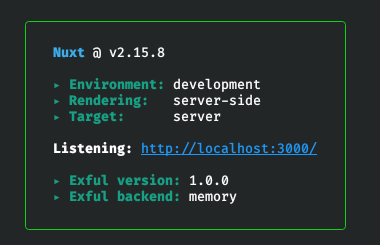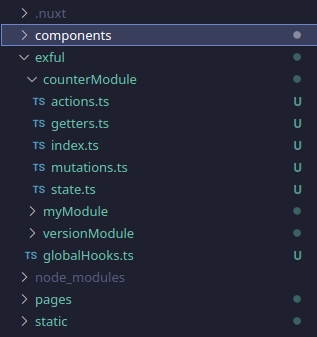exful v1.0.0
Exful
Exful is a highly experimental all in one state manager, API layer and server framework.
Currently it's only available for nuxt (version 2) since it relies on core nuxt functionality like the dynamic template system, SSR and built-in server.
Note The project is of prototype quality at best and has not be tested in a production context. Do not use it for anything serious.
How it works
Exful transforms the standard vuex store into a full stack framework.
The canonical state is persisted on the server using an in-memory or redis store.
Actions are run on the server and any mutations they generate are applied first to the server store. Then, the mutations are transfered to the client, keeping the two stores in sync.
Since actions are run on the server, typical server side logic like database calls can be run in actions.
Action invocations replace traditional API calls and mutations become the transmission format.
State access, getters and action dispatch are available in pages and components like when using a standard vuex store.
Everything works in both the SSR and client context.
The nuxt builder tracks exful modules and automatically generates types and interfaces making everything fully type-safe.
Installing
npm install exfulRegistering the modules
Exful includes one runtime and one build module that must be included in nuxt config.
// Modules for dev and build (recommended): https://go.nuxtjs.dev/config-modules
buildModules: [
// ...
"exful/nuxt/build"
// ...
]// Modules: https://go.nuxtjs.dev/config-modules
modules: [
// ...
"exful/nuxt/runtime"
// ...
]The modules accepts some optional configuration parameters. You can see what's available if you import nuxt's Config type.
Finally run npm run dev and you should see some extra info about exful after nuxt's standards messages if everything was hooked up correctly.

Using the CLI helper
A simple CLI helper is also included to create new exful modules. Use it to generate module skeletons and save some typing.
npx exc add myModuleIt's recommended to run it at least once to create the directory structure.
Directory structure
Exful modules live in an exful directory on the root of the project.
Nuxt builder will also auto-generate an exfulTypes.ts file on the root of the project and regenerate it automatically every time a module changes.

Module anatomy
Module definition
Inside the definition file (index.ts) of each module we define the module's structure by adding the types of the state, getters, mutations and actions. We also give it a name.
import {Module} from "exful";
export const {State, Getters, Mutations, Actions, Hooks, accessor} = Module<{
state: {
counter: number
},
getters: {
counterPlusOne(): number,
incrementedCounter(): (amount: number) => number
},
mutations: {
setCounter(payload: number): void
},
actions: {
updateCounter(payload: number): void
}
}>("counterModule");The Module() constructor will return type-safe initializers which we export and then import in their respective implementation files.
Note: the accessor property must always be exported so exful can properly register the module.
Note2 Only put server logic in the action and hooks files. All other files must be universal.
State
import {State} from "./index";
export default State(() => ({
counter: 0
}));Mutations
import {Mutations} from "./index";
export default Mutations({
setCounter(state, payload) {
state.counter += payload;
}
});Actions
Actions can commit mutations but also return results.
They can be sync or async but when dispatched they will always return a promise.
They are run on the server so you can add any logic normally found on the server side like database calls.
import {Actions} from "./index";
export default Actions({
updateCounter(context, payload) {
context.commit("setCounter", payload);
}
});Getters
import {Getters} from "./index";
export default Getters({
counterPlusOne(state, _getters) {
return state.counter + 1;
},
incrementedCounter: (state) => (amount) => {
return state.counter + amount;
}
});Hooks
Hooks can be used to implement authentication, validation, error reporting etc.
There are available before/after/error hooks for every module action.
The hook names are also type safe and are generated based on defined actions.
import {Hooks} from "./index";
export default Hooks({
"after:all": function(ctx) {},
"after:updateCounter": function(ctx) {},
"before:all": function(ctx) {},
"before:updateCounter": function(ctx) {},
"error:all": function(ctx) {},
"error:updateCounter": function(ctx) {}
});GlobalHooks
GlobalHooks can be defined in a file on the root exful directory.
As the name implies they are global and run for every module.
They can be used to implement store-wide functionality like central logging or error reporting.
import {GlobalHooks} from "exful";
export default GlobalHooks({
before(ctx) {},
after(ctx) {},
error(ctx) {}
});Usage in pages and components
Exful can be used like a standard vuex store.
The store can be accessed on this.$exful.
In the SSR context (asyncData etc) the store can be accessed on ctx.$exful.
<template>
<div>
<h1>Counter: {{ counter }}</h1>
<button @click="increment">
Increment
</button>
</div>
</template>
<script lang="ts">
import Vue from "vue";
export default Vue.extend({
name: "IndexPage",
computed: {
counter() {
return this.$exful.counterModule.state.counter;
}
},
methods: {
async increment() {
await this.$exful.counterModule.dispatch("updateCounter", 1);
}
}
});
</script>The whole API is again type-safe and every type is auto-generated by the nuxt builder.
Vue devtools
The store is available in vue devtools like a standard vuex store.
You can inspect state and mutations happening but manually mutating the store will not sync the state with the server.

The store is not compatibe with the new devtools but you can use the legacy version.
3 years ago